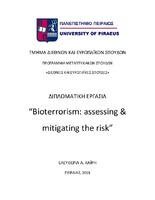| dc.description.abstractEN | The objective of the current thesis will be to address the threat of bioterrorism, which essentially is the use of biological weapons by a violent non-state actor, ΑΚΑ a terrorist group.
The academic community is at odds with the political elite in assessing the risk of biothreat. The academic community relies on empirical data, or lack thereof, to classify the threat as “low risk” but “high impact”, meaning that it is considered unlikely to happen, but if it does happen the consequences will be disastrous and far-reaching. That is not the case with policy-makers all over the world, who in the past year have augmented spending earmarked for the fight against the proliferation of weapons of mass destruction (WMD), which include biological weapons, and civil protection.
This difference of opinions stems from the responsibility to protect the public. Governments cannot simply ignore the risk of biological terrorism, because it ranks low on probability. The odds of a terror attack coming from the skies were also astronomically high, but three civilian aircrafts were hijacked and kickstarted the “War on Terror”, which continues to this day.
In a shifting and uncertain volatile environment, where the enemy is fighting with an ever-changing and evolving arsenal, decision-makers simply do not have the luxury to ignore threats to national and international security.
This thesis attempts to support the idea that the risk is real and present, looming over unprepared societies, which may be hit without prior notice by something far more deadly and terrifying than anything in a conventional arsenal.
The first part will attempt to explain the science behind biological weapons: what kind of technical know-how is required and what kind of equipment is needed to succeed in the creation of such weapons.
The second part will present the historical aspect of state-run biological programs from the earliest recorded uses all the way to the 21st century.
The third part will assess the risk of a terrorist organization acquiring weaponized pathogens, examining both previous incidents and theories developed on the matter.
The fourth part, will address all the systemic vulnerabilities that were identified throughout the thesis, by laying out a detailed policy proposal that covers the national emergency response system, all efforts by the international community to deal effectively –to a certain extent- with the issue, along with the fundamental 1972 Convention, and intelligence services. | el |



